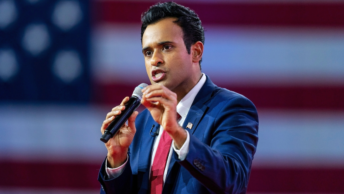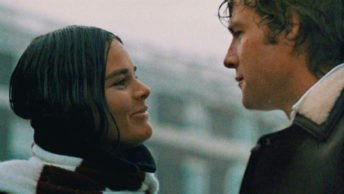The fissure in the Republican Party dates back, at least, to the nomination of Arizona Senator Barry Goldwater for president in 1964. The last presidential election underscored just how broad that split has gotten, one that has been festering for several generations.
The roots of the party’s philosophical divide can be traced back, even further to the crucial days of the Republican Roosevelt, shortly after the turn of the century when the American political edifice was in transition. It was during Theodore Roosevelt’s presidency that American society was at the height of a wave of social reform that would saturate its social, economic and politic landscape for well over 100 years.
The Progressivism Movement originated from a spirit of reform that had permeated American society, even before the dawning of the 20th century. Some chroniclers date the publication of Edward Bellamy’s 1888 novel Looking Backward as the beginning point of a national awareness of the unintended consequences of an unfettered capitalism.
Set in the year 2000, Bellamy’s book depicts a utopian society run with the hierarchical efficiency of a military battalion. The workers in Bellamy’s idealized world belonged to a unified industrial army that labored in an economy controlled by a group of central planners that was more productive than a primitive capitalism.
By 1901, Progressivism was an upper middle class movement, largely located in the urban areas where human deprivations, poverty and squalor were most visible. It arose in response to the opulence, and material excesses of the Gilded Age that emerged in the unregulated capitalism of post-bellum America. Its leaders were cut from the societal whole cloth of law, medicine, politics and social work. As well-educated members of a professional elite, their Gnostic sense of self-righteousness inspired them to bear pressure on city governments and corporations to improve housing, recreational, and health conditions in America’s cities.
Reforming the social milieu was just the tip of their ideological iceberg. Progressives sought reform as a means of replacing the old cultural order with a more modern structure that would extend the American Dream to millions of Americans through a calculated distribution of upper class wealth. At the bulwark of the old order was a John Wayne-esque rugged individualism that had brought the country into the 20th century. Progressives saw individualism as symptomatic of all that was wrong with America. They argued that a more collective approach would heal society’s ills.
At the heart of progressive thinking was the notion of continual progress. This was not the limited economic progress of the General Electric ad campaign that boasted in the 1950s that progress is our most important product. Progressives thought in terms of the Whig theory of History, which proclaimed that history was an inevitable march upward into enlightenment. Progress was inevitable because of the Enlightenment’s deification of science and human reason in the 18th century.
While the progressives paid lip service to maintaining America’s individual freedoms, their plan involved the coercive intrusion in the daily lives of millions of Americans in order to ensure the general welfare for the poor and downtrodden. But, like all great theories, the idea of eternal progress had its detractors. Originally, they were known as Tories. The mainstream media labeled them conservatives, obstructionists, reactionaries, and today hate-mongers.
In their rosy worldview, progressives see the inherent beauty in mankind while conservatives focus only on the flawed nature of human beings while relentlessly clinging to their old wasted traditions of faith, economics, morality and law. This philosophical dichotomy dates back to at least, St. Augustine’s The City of God in the 4th century. Progressives believe that science and evolution endow their policies with an infallible certainty that never should be challenged, especially by Theological principles. Progressives believed that their reforms would eventually create modern forms of liberal democracy, which is not unlike the Republican’s foreign policy in Afghanistan and Iraq during the early 21st century.
In American history, reform movements have come and gone. Progressivism owes much of its longevity to magazine editor, Herbert Croly. The editor of The Nation’s publication of his seminal book, The Promise of American Life in 1909 provided both the revolutionary theory and the practical methodology for the Progressive Movement’s success. Croly’s Progressive Bible deftly synthesized the federalist thinking of Alexander Hamilton, the country’s first Secretary of the Treasury with the secular humanism of its third president, Thomas Jefferson. It is not surprising that Croly’s detractors referred to him as Crolier than thou.
Hamilton believed in a strong central government that promoted and protected national business interests. Jefferson believed that the best government was that which governed least. Illustrative of his thinking was his policy of defending America’s extensive coastline with a flotilla of small boats. His opponents quickly labeled his boats the mosquito fleet. Jefferson also disdained American businessmen while idealizing the agrarian community as the epitome of America’s goodness and virtue.
Croly’s revolutionary ideas can easily be viewed through the prism of pure Hegelian brilliance. Croly took Hamilton’s thesis of big government and combined it with Jefferson’s antithesis of social concern to create a paradigm where big government would work to foster the welfare of the lower level of humanity on Thomas Hobbes’ pyramid. In theory, progressive government would become the Guarantor for Jefferson’s ideals, using Hamiltonian means. Instead of favoring business success and creating millionaires, the state would now work to spread the wealth to America’s lower classes, which had been left waiting at the dock of America’s never-ending prosperity.
Croly’s progressive synthesis not only created a roadmap for buying future political elections through the judicious use of the United States Treasury, it also bled into the culture, causing a transformation that heralded the decline of American exceptionalism. For this cultural transformation, progressives looked to the classroom as the most obvious place to start.
Until the mid-19th century, education had been the province of the American family. Religious education had always been an important part of their education with the Bible serving as their textbook. In his 1848 Communist Manifesto, Communist Karl Marx argued for free public education, which would transfer cultural education from the family to the secular schools.
If Croly was the progressive enlightenment’s Diderot, then its Rousseau was progressive educator John Dewey. Dewey and others like him, such as sociologist Lester Ward, echoed Marx when he proclaimed that the country needed a universal system of pubic education. In his book, Ethics of Democracy, Dewey lauded Plato’s idea of the perfect man in the perfect state. To Plato’s ideal, Dewey wedded Hegel’s conviction that the state is the divine idea, as it exists on earth so as to create the perfect man. Since Dewey put unlimited faith in the unlimited powers of government to elevate mankind, he called for the dissolution of the private sector.
In stark contrast to America’s founding principles, Dewey wrote that freedom is not something that individuals have as a ready-made possession. It is not a gift of God or nature. Like human rights, freedom was a beneficent gift of the state. Since human beings were not naturally free, natural rights or natural law did not exist. Therefore, Dewey concluded natural rights and natural liberties exist only in the kingdom of mythological social zoology.
Many traditional Republicans blamed Roosevelt’s Progressive Party challenge in the 1912 election as the cause of incumbent William Taft’s devastating defeat. Their complaint misses the fact that over well over 75% of the voters cast their ballots for progressive candidates, including socialist Eugene V. Debs.
According to Judge Anthony Napolitano’s 2012 book, Theodore and Woodrow, as candidates, Roosevelt and Wilson were nearly indistinguishable. One only needed to look into Alice’s looking glass to see their differences. In effect, Roosevelt’s New Nationalism and Wilson’s New Freedom were as distinct as Alice’s Tweedledee and Tweedledum.
Teddy Roosevelt, the legendary hero of San Juan Hill, was the perfect warrior for the Progressive Reform Movement. A member of America’s ruling elite, it was while a student at Harvard University that he first supped at the table of moral outrage and guilt that engendered his visceral reaction to the deplorable living conditions in America’s Eastern cities. During his two years as Police Superintendent of New York City, Roosevelt was appalled by the decline of morals and general lawlessness that allowed bordellos, gambling parlors and opium dens to sully New York City’s public image.
Like most of his patrician friends, Roosevelt believed in what the French called a noblesse oblige, or a moral obligation, not only to help the poor and unfortunate, but also to change their behaviors. Like President Barack Obama, Roosevelt also had a characteristic disdain for big business. He believed his role was to divest the wealthy of their money and power while indirectly embedding ordinary people as dependents on government’s largesse or what radio commentator has often called a permanent underclass. This put Roosevelt at odds with the GOP’s old Guard, such as Massachusetts Senator Henry Cabot Lodge.
As president, Roosevelt was an indefatigable trustbuster who promised to hold businesses accountable for their indifference to American poverty. As the nation’s first environmentalist, Roosevelt wanted to conserve America’s natural resources. Overall, his progressive ideas hoped to revolutionize American political history while changing the nature of American society and its culture. His social and economic reforms set the country on a dangerous path, lined with socialist brambles and Marxist vines.
Both Roosevelt and Wilson internalized the basic principles in Croley’s book and concretized them in their respective political positions on the economy, social needs and the environment. While their political and moral philosophies were fungible, Roosevelt and Wilson’s differences were essentially the accidentals of birth, geography, family upbringing and religious belief. Wilson was a Southerner with the soul of a Calvinistic preacher and the mind of an Anglophile academic. Influenced by the South’s racial prejudice, Wilson had little trouble in accepting the eugenic philosophy that fleshed the soft underbelly of Progressivism.
Roosevelt’s Progressivism was tied more to his social class while Wilson’s religious faith sent him on a divine mission to right the wrongs of the capitalist world. Roosevelt was more traditionally Protestant but also subscribed to the eugenics beliefs that the white Anglo and Aryan Protestant race were superior to all others.
Both Roosevelt and Wilson believed that the Constitution was anachronistic and posed a threat to their duty to implement their reforms. Their perspective dovetailed with the progressives’ notion of an evolving or living Constitution, which, like all living beings, could rightfully be expected to grow and to adapt to changing circumstances. To the progressives, there were no absolutes, so that the Constitution had to conform to the changing times. As Napolitano stressed, both were determined to use the presidency to redistribute wealth, regulate and change personal behavior and consolidate executive power at the expense of the United States Constitution.
Today, Progressivism’s Hegelian synthesis has become the benchmark for American politics. The Republican establishment has not been shy in its deliberate participation in big government politics since their Roosevelt. The Big Lie in Washington is that the parties are substantially distinct. Both parties have been comfortable with increased government spending programs in Washington because they have been a proven formula for political longevity.
When conservative interlopers come along every generation or so, the progressives of both parties see their livelihoods threatened. This fact has never been truer than in the Election of 2016 and its combative aftermath. The Establishment is convinced the Republican Party cannot win any national election solely by appealing to its base of traditional values, constitutional and social conservatives. The Republicans’ tired leadership still thinks that the way to win elections is to outdo the Democrats in their specific outreach to immigrants, women, Hispanics and blacks the poor, homosexuals and other minorities.
What they refuse to understand is their big tent approach is not only a failed policy but is riven with the likelihood of alienating their traditional voters and inviting their political tent to collapse around them. This explains the animus so many in Donald Trump’s adopted party have directed toward the President.
As a result, many Republicans have earned the sobriquet of Rino or Republican In Name Only. This term’s inherent meaning can be traced back to 1912 when Roosevelt, Taft and Wisconsin Senator Robert Lafollette denounced each other before the general election as not representing true Republican values.
In the 1930s through the end of the 20th century, RINOS were called Me-too Republicans who ran on a platform that was nearly indistinguishable from that of the Democrats. The best example is two-time presidential candidate Thomas E. Dewey, who ran against Franklin Roosevelt in 1944 and Harry Truman in 1948. While Dewey supported Roosevelt’s New Deal, he promised Republicans would run them more efficiently and with less corruption.
Today, progressives of both parties continue to embrace Marxist concepts such as diversity, environmentalism and homosexual marriage. Promises of shutting down entire departments or cutting trillions in spending is mostly talk because once a department becomes funded it is here forever. The significant difference in the two parties is the speed of their getting to the end of the political abyss when the piper will have to be paid.
The political situation congers up the images in Joseph Wambaugh’s 1970 novel, The New Centurions, where Los Angeles police officers were the last barrier between the barbarians in the streets and total social breakdown. Traditional Republicans and Trump’s populists might rightly be called The Last Centurions.








